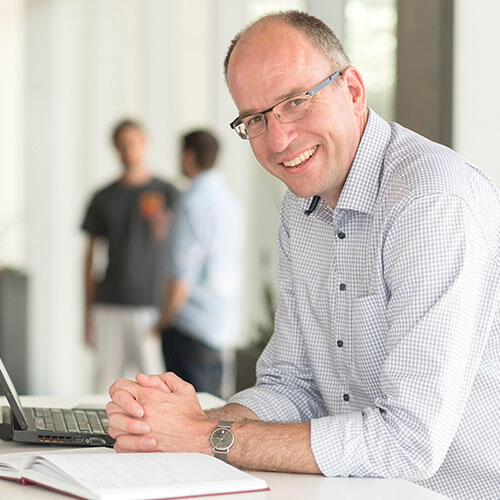Researchers at the Institute for Quantum Computing (IQC) at the University of Waterloo are doing more than tackling trailblazing theoretical and applied research that expands our understanding of quantum mechanics.
Faculty, postdoctoral researchers and students - from undergraduates to PhD candidates - are showing the powerful possibilities of applied quantum technologies and research commercialization, making a deep and lasting impact on society.
IQC was launched in 2002 with investment from BlackBerry founder Mike Lazaridis. Since then, IQC researchers have produced more than 3,000 peer-reviewed papers and 125,000 citations - making it one of the most academically influential quantum research institutes in the world. IQC has also spun out more than 20 quantum startups and 40 per cent of its researchers are involved in commercialization.
 Dr. Norbert Lütkenhaus, IQC's executive director and professor in the Department of Physics and Astronomy, says Canada has been forward thinking about investing in quantum science and technology long before launching its National Quantum Strategy to boost quantum research and innovation.
Dr. Norbert Lütkenhaus, IQC's executive director and professor in the Department of Physics and Astronomy, says Canada has been forward thinking about investing in quantum science and technology long before launching its National Quantum Strategy to boost quantum research and innovation.
"Canada made quantum information one of its scientific pillars, understanding its importance, making investments for advancements and seeing it as an area of strength," he says. "This has moved quantum science and technology from being important to the focus point it is today."
He adds that investment pushes the boundaries of quantum science and innovation and fosters a productive educational and training environment.
Breaking down research silos and bringing researchers in at the Mike & Ophelia Lazaridis Quantum-Nano Centre and the Research Advancement Centre has fostered interdisciplinary collaboration and scientific advancements.
"The power of a physically close community is unique to Waterloo. You'd think that collaboration would be just a 'nice to have' but it does change the dynamic of research," says Emiliia Dyrenkova, master's student in Computer Science and Quantum Information.

She first joined IQC in 2022 when she was an undergraduate student in electrical engineering and computer science at the University of California, Berkeley to attend IQC's summer program Undergraduate School on Experimental Quantum Information Processing (USEQIP).
"There are so many resources here that bring researchers together in a very collaborative atmosphere," Dyrenkova says. "A big thing that attracted me coming back for a master's is seeing opportunities during social events to chat with people and having these friendly connections to people outside of your research group that allows you to go to them and ask any question. The undergraduate program was a nice sample of that."
Lütkenhaus says since IQC's founding in 2002, computer scientists, physicists, chemists and engineers have all shared a space and worked in close contact.
"That is what makes us successful in the way that we are. It creates an atmosphere that people look to IQC for."
Before joining IQC, Dyrenkova was already naturally curious about quantum mechanics and its potential, but USEQIP deepened her interest.
Dyrenkova is currently researching ways to encode electrons into qubits, the tradeoffs and optimizations that come with it and how to make the encoding useful. But what originally drew her to quantum mechanics is the potential for breakthrough applications in materials sciences and even new drug discoveries.
"What piqued my interest at the start and still motivates my current research is how to simulate chemistry and physics with quantum computers," she says. "How do we use this new computational paradigm to solve scientific problems?"
From fundamental research to industry applications
Beyond applied and theoretical research, IQC faculty and students are also driven to commercialize their technology for industry applications, including Phantom Photonics co-founder and CEO Alex Maierean (MMath '24).
Phantom Photonics is developing quantum sensors that are better at detecting faint signals by using advanced techniques to ignore background noise. Their product has direct applications for industries with marine and space operations.
Banner image features (left-right): Dr. Thomas Jennewein, Alex Maierean, and Dr. Shihan Sajeed
Maierean, who is also a part-time PhD student at IQC, founded Phantom Photonics with IQC affiliates Dr. Thomas Jennewein and Dr. Shihan Sajeed. When she joined IQC her vision stretched beyond foundational scientific discovery - she wanted to be a startup founder.
"There is a lot of willingness for commercialization at IQC even though students are very focused and enthusiastic about research," Maierean says. "Pulling someone away to run a startup is a different kind of challenge but IQC is a place that supports technology commercialization."
Now Phantom Photonics is at Velocity, University of Waterloo's centre of entrepreneurship. And since joining last year, the company has tested its product in Halifax, expanded its staff to seven in total, received non-dilutive funding and is now preparing for a seed funding round.
Lütkenhaus says connecting departments and disciplines, ranging from theory to applied sciences, is powerful for developing startups.
"Fostering connections at our physical locations builds on Waterloo's reputation for encouraging commercial spinoffs and the outstanding creator-owned IP policy," he says. "IQC is enhancing the workforce and creating the next generation of researchers."
Building on a century of quantum mechanics
What continues to excite and motivate Dyrenkova is the scientific exploration of what's possible.
"It piqued my curiosity that quantum mechanics is so counterintuitive," she says. "I have an appetite for out of the ordinary ideas and quantum mechanics is interesting on this fundamental level," she says.
Lütkenhaus adds that despite quantum mechanics' reputation for being counterintuitive, a hundred years of studying and applying its principles shows its power and utility.
"The intuition can be built up," he says. "All the elements can be calculated, understood and predicted mathematically no problem - there is no mystery."






